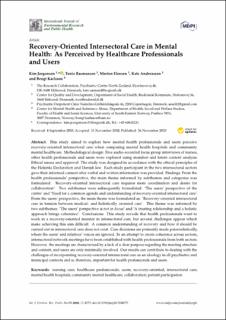| dc.contributor.author | Jørgensen, Kim | |
| dc.contributor.author | Rasmussen, Tonie | |
| dc.contributor.author | Morten, Hansen | |
| dc.contributor.author | Andreasson, Kate | |
| dc.contributor.author | Karlsson, Bengt Eirik | |
| dc.date.accessioned | 2021-05-11T11:38:57Z | |
| dc.date.available | 2021-05-11T11:38:57Z | |
| dc.date.created | 2020-11-26T21:18:07Z | |
| dc.date.issued | 2020 | |
| dc.identifier.citation | Jørgensen, K., Rasmussen, T., Hansen, M., Andreasson, K., & Karlsson, B. (2020). Recovery-Oriented Intersectoral Care in Mental Health: As Perceived by Healthcare Professionals and Users. International Journal of Environmental Research and Public Health, 17(23). | en_US |
| dc.identifier.issn | 1661-7827 | |
| dc.identifier.uri | https://hdl.handle.net/11250/2754893 | |
| dc.description.abstract | This study aimed to explore how mental health professionals and users perceive recovery-oriented intersectoral care when comparing mental health hospitals and community mental healthcare. Methodological design: Five audio-recorded focus group interviews of nurses, other health professionals and users were explored using manifest and latent content analysis. Ethical issues and approval: The study was designed in accordance with the ethical principles of the Helsinki Declaration and Danish law. Each study participant in the two intersectoral sectors gave their informed consent after verbal and written information was provided. Findings: From the health professionals’ perspective, the main theme informed by subthemes and categories was formulated: ‘Recovery-oriented intersectoral care requires more coordination and desire for collaboration’. Two subthemes were subsequently formulated: ‘The users´ perspective of the centre’ and ‘Need for a common agenda and understanding of recovery-oriented intersectoral care’. From the users´ perspective, the main theme was formulated as: ‘Recovery-oriented intersectoral care in tension between medical- and holistically oriented care’. This theme was informed by two subthemes: ‘The users´ perspective is not in focus’ and ‘A trusting relationship and a holistic approach brings coherence’. Conclusions: This study reveals that health professionals want to work in a recovery-oriented manner in intersectoral care, but several challenges appear which make achieving this aim difficult. A common understanding of recovery and how it should be carried out in intersectoral care does not exist. Care decisions are primarily made paternalistically, where the users’ and relatives’ voices are ignored. In an attempt to create coherence across sectors, intersectoral network meetings have been established with health professionals from both sectors. However, the meetings are characterised by a lack of a clear purpose regarding the meeting structure and content, and users are only minimally involved. Our results can contribute to dealing with the challenges of incorporating recovery-oriented intersectoral care as an ideology in all psychiatric and municipal contexts and is, therefore, important for health professionals and users. | en_US |
| dc.language.iso | eng | en_US |
| dc.rights | Navngivelse 4.0 Internasjonal | * |
| dc.rights.uri | http://creativecommons.org/licenses/by/4.0/deed.no | * |
| dc.title | Recovery-Oriented Intersectoral Care in Mental Health: As Perceived by Healthcare Professionals and Users | en_US |
| dc.type | Peer reviewed | en_US |
| dc.type | Journal article | en_US |
| dc.description.version | publishedVersion | en_US |
| dc.rights.holder | © The Author(s) 2020. | en_US |
| dc.source.volume | 17 | en_US |
| dc.source.journal | International Journal of Environmental Research and Public Health (IJERPH) | en_US |
| dc.source.issue | 23 | en_US |
| dc.identifier.doi | https://doi.org/10.3390/ijerph17238777 | |
| dc.identifier.cristin | 1853162 | |
| dc.source.articlenumber | 8777 | en_US |
| cristin.ispublished | true | |
| cristin.fulltext | original | |
| cristin.qualitycode | 1 | |

